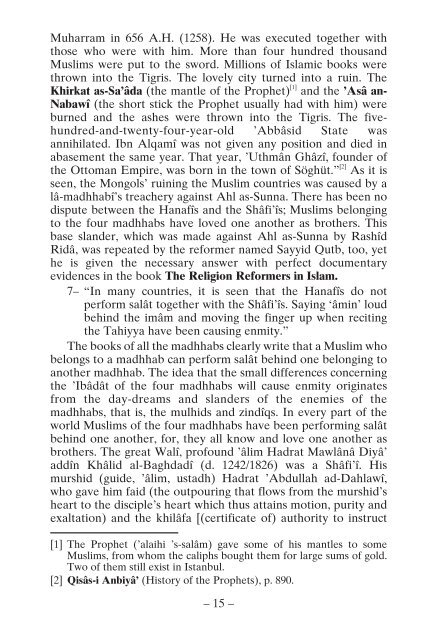Answer to an Enemy of Islam
Answer to an Enemy of Islam This is a refutation of the lies and slanders which the lâ-madhhabî Rashîd Rıdâ of Egypt, who appeared in the disguise of a religious man and wrote against the scholars of Islam in his book Muhâwarât.
Answer to an Enemy of Islam
This is a refutation of the lies and slanders which the lâ-madhhabî Rashîd Rıdâ of Egypt, who appeared in the disguise of a religious man and wrote against the scholars of Islam in his book Muhâwarât.
You also want an ePaper? Increase the reach of your titles
YUMPU automatically turns print PDFs into web optimized ePapers that Google loves.
Muharram in 656 A.H. (1258). He was executed <strong>to</strong>gether with<br />
those who were with him. More th<strong>an</strong> four hundred thous<strong>an</strong>d<br />
Muslims were put <strong>to</strong> the sword. Millions <strong>of</strong> <strong>Islam</strong>ic books were<br />
thrown in<strong>to</strong> the Tigris. The lovely city turned in<strong>to</strong> a ruin. The<br />
Khirkat as-Sa’âda (the m<strong>an</strong>tle <strong>of</strong> the Prophet) [1] <strong>an</strong>d the ’Asâ <strong>an</strong>-<br />
Nabawî (the short stick the Prophet usually had with him) were<br />
burned <strong>an</strong>d the ashes were thrown in<strong>to</strong> the Tigris. The fivehundred-<strong>an</strong>d-twenty-four-year-old<br />
’Abbâsid State was<br />
<strong>an</strong>nihilated. Ibn Alqamî was not given <strong>an</strong>y position <strong>an</strong>d died in<br />
abasement the same year. That year, ’Uthmân Ghâzî, founder <strong>of</strong><br />
the Ot<strong>to</strong>m<strong>an</strong> Empire, was born in the <strong>to</strong>wn <strong>of</strong> Söghüt.” [2] As it is<br />
seen, the Mongols’ ruining the Muslim countries was caused by a<br />
lâ-madhhabî’s treachery against Ahl as-Sunna. There has been no<br />
dispute between the H<strong>an</strong>afîs <strong>an</strong>d the Shâfi’îs; Muslims belonging<br />
<strong>to</strong> the four madhhabs have loved one <strong>an</strong>other as brothers. This<br />
base sl<strong>an</strong>der, which was made against Ahl as-Sunna by Rashîd<br />
Ridâ, was repeated by the reformer named Sayyid Qutb, <strong>to</strong>o, yet<br />
he is given the necessary <strong>an</strong>swer with perfect documentary<br />
evidences in the book The Religion Reformers in <strong>Islam</strong>.<br />
7– “In m<strong>an</strong>y countries, it is seen that the H<strong>an</strong>afîs do not<br />
perform salât <strong>to</strong>gether with the Shâfi’îs. Saying ‘âmin’ loud<br />
behind the imâm <strong>an</strong>d moving the finger up when reciting<br />
the Tahiyya have been causing enmity.”<br />
The books <strong>of</strong> all the madhhabs clearly write that a Muslim who<br />
belongs <strong>to</strong> a madhhab c<strong>an</strong> perform salât behind one belonging <strong>to</strong><br />
<strong>an</strong>other madhhab. The idea that the small differences concerning<br />
the ’Ibâdât <strong>of</strong> the four madhhabs will cause enmity originates<br />
from the day-dreams <strong>an</strong>d sl<strong>an</strong>ders <strong>of</strong> the enemies <strong>of</strong> the<br />
madhhabs, that is, the mulhids <strong>an</strong>d zindîqs. In every part <strong>of</strong> the<br />
world Muslims <strong>of</strong> the four madhhabs have been performing salât<br />
behind one <strong>an</strong>other, for, they all know <strong>an</strong>d love one <strong>an</strong>other as<br />
brothers. The great Walî, pr<strong>of</strong>ound ’âlim Hadrat Mawlânâ Diyâ’<br />
addîn Khâlid al-Baghdadî (d. 1242/1826) was a Shâfi’î. His<br />
murshid (guide, ’âlim, ustadh) Hadrat ’Abdullah ad-Dahlawî,<br />
who gave him faid (the outpouring that flows from the murshid’s<br />
heart <strong>to</strong> the disciple’s heart which thus attains motion, purity <strong>an</strong>d<br />
exaltation) <strong>an</strong>d the khilâfa [(certificate <strong>of</strong>) authority <strong>to</strong> instruct<br />
[1] The Prophet (’alaihi ’s-salâm) gave some <strong>of</strong> his m<strong>an</strong>tles <strong>to</strong> some<br />
Muslims, from whom the caliphs bought them for large sums <strong>of</strong> gold.<br />
Two <strong>of</strong> them still exist in Ist<strong>an</strong>bul.<br />
[2] Qisâs-i Anbiyâ’ (His<strong>to</strong>ry <strong>of</strong> the Prophets), p. 890.<br />
– 15 –

















